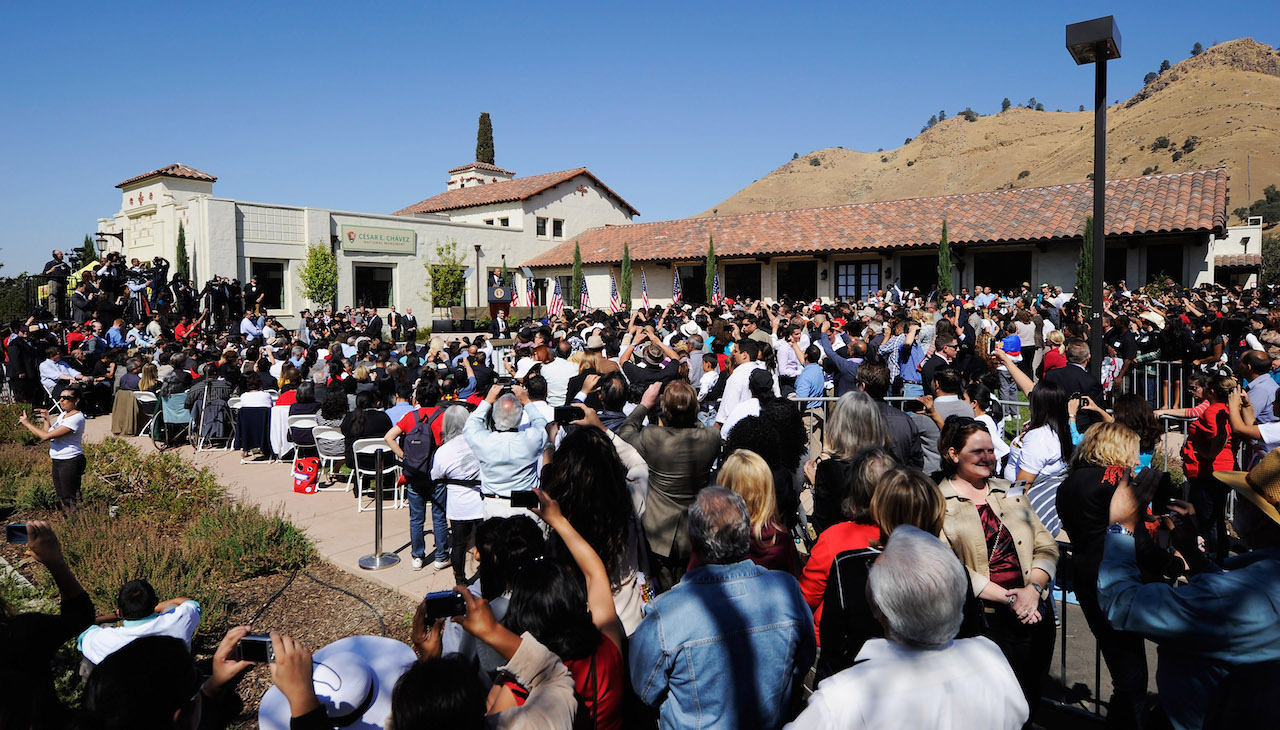
Hispanic Access Foundation identifies 12 Latino national parks and monuments in need of protection
The nonprofit found the sites facing gentrification, weathering, or development and prioritized their preservation.
With 2022 nearing its end, Washington D.C.-based, Hispanic nonprofit, The Hispanic Access Foundation, recently released a report identifying 12 Latino national parks, sites, monuments, as well as wildlife refuges sites — calling on President Joe Biden and Congress — to prioritize for protection and preservation in the new year as they face certain climate and human-caused threats.
"Many of the sites face threats from weathering of structures to development and gentrification that jeopardize the long-term future of each landmark. Latinos and other communities of color continue to face the Nature Gap, lacking the benefits that nearby nature brings,” the report reads.
The parks and sites include the Cesar E. Chavez National Monument, which is being expanded to become the César E. Chávez and the Farmworker Movement National
Park, Avi Kwa Ame National Monument, the Berryessa Snow Mountain National Monument Expansion, Castner Range National Monument, Chesapeake National Recreation Area, Chumash Heritage National Marine Sanctuary, Friendship Park, Gila River Wild & Scenic, Hudson Canyon National Marine Sanctuary, Los Dos Laredos Binational Park, the Pacific Remote Islands National Monument Expansion & Renaming, and the Wildlife Refuge in the Rio Grande Valley. The report also promotes the passage of the Protecting Unique and Beautiful Landscapes by Investing in California (Public) Lands Act — which identifies a number of other sites in California in need of restoration and prioritizes them.
The nonprofit also wrote that Biden and Congress acting quickly on the preservation of the named sites would also bring other benefits in regards to health.
“It also impacts physical and mental health. Spending time in natural areas, on the coast, and around waterways has well-documented benefits to mental health, from stress reduction to decreases in anxiety and depression. They also boost physical health by making the air cleaner and incentivizing exercise, reducing the risk of lung diseases and COVID-19,” the report said.
Besides simply being national sites and important outdoor spaces for families and individuals — at least in the case of these 12 sites — they are also historical and carry huge significance for many Latinos across the nation. They serve as almost a museum for others, telling a narrative not available anywhere else.
RELATED CONTENT
According to the nonprofit’s report, less than 25% of national parks right now in the U.S. have a purpose of any sort that is documenting historically neglected, forgotten, and disenfranchised communities, such as the Latino community, which is ever growing. Additionally, less than 8% of these sites represent narratives sensitive to Latinos or other groups of color.
San Diego's Friendship Park is one of the very few that does have that representation and importance. It is near the U.S.-Mexico border, and has for decades been a well known gathering area for those with families on either side to come and meet and also for the general public to take in the wonderful Southern California scenery.
However, it is currently at risk of losing that meaning as it is being proposed to turn into a border wall. As the report says, the new proposal would endanger a lot of the wildlife in the coastal area and impede access to the nearby Border Fields State Park and Tijuana River National Estuarine Research Reserve.
Another is the Avi Kwa Ame, one of Southern Nevada’s most majestic landscapes that is biologically diverse, and also holds cultural importance to the lands in the whole Mojave Desert. There are mountains, canyons, natural springs, and bajadas that are sacred to the 10 Yuman speaking tribes, the Hopi, as well as the Chemehuevi Paiute. Making it a national monument would bring Nevada’s outdoor recreation economy to nearby towns. It would also serve as an important step towards a better relationship between Latino and Tribal communities.
“For these reasons, in the new year Hispanic Access Foundation is asking President Biden and Congress to designate and protect new parks, waterways and coastal areas throughout the U.S. that will serve Latino and other disinvested communities,” Shanna Edberg, director of conservation at Hispanic Access Foundation, said in a statement.
The Hispanic Access Foundation report comes after President Biden took steps to designate Camp Hale-Continental Divide National Monument in October; and has pledged to designate Nevada’s Avi Kwa Ame as a national monument.
“These areas, and many more that are important to Latino communities, will serve innumerable purposes with their protection,” Edberg said.“Protecting these areas would provide these benefits and more to local communities and visitors, while becoming jewels in the crown of the America the Beautiful initiative to protect 30% of U.S. lands, waters, and ocean by 2030,” reads the report.











LEAVE A COMMENT: